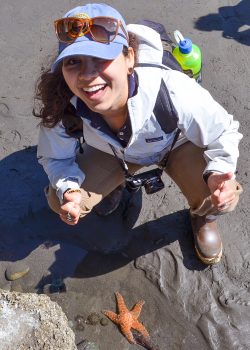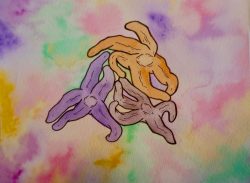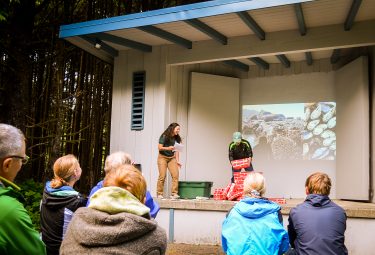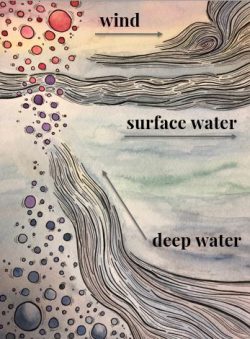
The coast of Washington is a remote and wild place, where waves bash the rocky shoreline, whales meander just offshore and tidepools teem with eye-popping displays of life. That wildness is precisely what Zoe van Duivenbode relished about her time as a marine educator stationed at Kalaloch Beach, working for Olympic National Park. She spent her days exploring the coast, taking detailed notes and painting the seascapes in front of her, thinking about ways she could connect the lessons of the sea to visiting tourists on their summer vacation.
“I spent all my time in the intertidal zone,” Zoe says. “If I wasn’t leading interpretative programs during the low tide, you could find me knee deep in water searching every crevasse for nudibranchs, chitons and any other marine invertebrate that may be hiding.”
A native of Long Beach, California, Zoe’s connection to the sea stretches over her life and is a constant. Now in her second year at the College of the Environment’s School of Marine and Environmental Affairs, she focuses on how climate change and ocean acidification will impact social and ecological communities. A core piece of her work includes becoming a better communicator of science to inspire people of all ages to be caretakers of our planet.

So when the opportunity arose to work on the coast and work with visitors across the United States and world, Zoe jumped at the chance. She was awarded the Future Park Leaders for Emerging Change Internship, a program for graduate students to work on climate issues related to emerging needs in national parks. Zoe brought her expertise on climate and oceans, helping with the Junior Ranger program, leading park visitors on tide pool walks, and hosting evening programs at the Kalaloch campground.
No day was the same, and Zoe was struck by the fact that people from all walks of life were drawn to the park, seeking to learn about the forests and the ocean. Many were visiting the coast for the first time.
“There is no ‘one size fits all’ approach when it comes to communicating science and I definitely learned that this summer, “ said Zoe. “Each program I hosted was different as no audience was ever the same. Some days rambunctious kids dominated the audience, while other days the crowd included UW scientists and were primarily adults. Because of how variable and diverse the audience was from day to day, it was a great challenge in learning how to be adaptive and tailor your communication to fit the needs of who were presenting to.”

All of that practice allowed Zoe to hone how she talked about ocean science with park patrons. One topic she talked a lot about was ocean acidification, which can be a difficult concept to convey. But she was able to break down complex topics using analogies and issues people deal with in their daily lives. By learning about marine organisms that were directly impacted by changing ocean conditions during her tide pool walks, visitors began to understand how the oceans are changing, and more people wanted to know what they could do about it.
She was also able to use her time to help the National Park Service take its first steps in developing an ocean acidification communication toolkit, which will help rangers and park scientists track ocean acidification research and monitoring programs taking place in national parks across the country, and to provide them with information on impacts to marine species and ecosystems. Additionally, the toolkit will include a suite of outreach and education materials, effective communication tips, interpretive programs and case studies of different ocean acidification monitoring projects taking place within the national parks for interpreters and educators.

Back on campus, Zoe turned her attention to a more urban setting as a Climate Communications Intern at King County, working to ensure that information on climate change is accessible to all communities in south King County. She is currently wrapping up her time at UW and preparing to head to California, where she accepted a position with San Mateo County’s Office of Sustainability leading a K-12 program on climate change and sea level rise.
“My summer working for Olympic National Park and on the Washington coast really ignited my passion for science communication. For me, this field is about exploring innovative and non-traditional approaches to science communication that are engaging, informative, and inspirational, as a way to foster meaning experiences and connections with people.”

